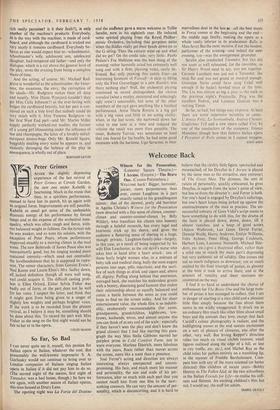So Far, So Bad
I CAN never quite see it, myself, this passion for Italian opera in Italian, whatever the cost. But presumably the well-known impresario S. A. Gorlinsky would not continue to bring over to London companies of Italians singing Italian Opera in Italian if it did not pay him to do so. (The second night of the season, first night of Turandot, was a bad house, though.) So here we are again, with another season of Italian operas, this time housed at Drury Lane.
The opening night was La Forza del Destino
and the audience gave a warm welcome to Tullio Serafin, now in his eightieth year. He induced some spirited playing from the Royal Philhar- monic Orchestra, including that gorgeous noise when the fiddles really get their heads down -on to the G string. Then the curtain went up and what did we get? On the credit side, very little : Paolo Pedani's Fra Melitone was the best thing. of the evening; rather hammily acted but extremely well sung and with a firm, pleasing voice, easily de- livered. But only praising this comic friar—an interesting foretaste of Falstaff—is akin to liking only the First Gravedigger in a new Hamlet; was there nothing else? Well,. the orchestral playing continued to sound distinguished, the chorus sounded (what a motley, untutored and amazingly ugly crew !) reasonable, but none of the other members of the cast gave anything like a finished performance. Anna Maria Rovere is a big girl with a big voice and little or no acting ability; when, in the last scene, she narrowed down her voice to one note at a time and reduced the volume the result was more than passable. The tenor, Roberto Turrini, was sometimes so loud that one feared for his health; he had some good moments with the baritone, Ugo Savarese, in their marvellous duet in the last be. call the best music in Forza comes at the beginning and the end— the. middle sags fatally, making the opera as a whole vastly inferior to its predecessor Ballo in Ma.schera). But the most incisive, if not the loudest, performer of the eveningand indeed the next evening, too—was the omnipresent prompter.
Serafin also conducted Turandot, but this did not seem 'as well rehearsed, for the ensemble, as Sir Henry Wood used to. say, was not together. Carmen Lucchetti was just not a Turandot; She sang flat and was not grand or musical enough. Giuseppe Savio could have sung Calaf well enough if he hadn't bawled most of the time. The Liu was almost as big a pain in the neck as the previous night's. Preziosilla. Ping was the excellent Pedani, and Lorenzo Gaetani was a moving Timur.
So far, so bad; but things may improve. At least there are some repertoire novelties to come : L'Amico Fritz, La Sonnambula, Andrea Chenier, Gitglielmo Tell and a new opera called Vivi, by one of the conductors of the company, Franco Mannino; though'how that fainous Italian opera I Pesvatori di Pelle comes in I .cannot imagine.
J01-114 AMIS


































 Previous page
Previous page